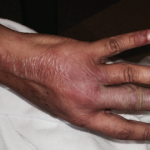In a recent clinical trial, voclosporin proved safe and effective at both low and high doses as a treatment for lupus nephritis…


In a recent clinical trial, voclosporin proved safe and effective at both low and high doses as a treatment for lupus nephritis…
Arthritis Care & Research |
New research has examined the risk of cardiovascular disease (CVD), as well as myocardial infarction and ischemic stroke, for patients with systemic lupus erythematosus (SLE) in a large-scale population-based study. Researchers found that patients with SLE have a greater than two-fold increased risk of developing CVD. This risk is greatest during the first year after diagnosis and remains elevated for at least five years…

New research has linked a TNFSF13B variant and B cell activating factor (BAFF), a common therapeutic target, with multiple sclerosis and systemic lupus erythematosus. The variant is a disease-risk allele associated with increased levels of soluble BAFF…
Most SLE clinical trials continue standard background medications being taken by patients at entry, based on assumptions that this minimizes the risk of serious flares and that immunologic interference is minimal. These assumptions are not evidence based, but eliminating polypharmacy in trials studying patients with active lupus remains controversial. These researchers tested the withdrawal of immunosuppressants to make SLE trial results more interpretable…

Multi-disciplinary care may be a slowly growing trend. One clinic in Ohio is raising the bar for lupus patients, serving as a one-stop center for diagnostic testing, imaging services and physical therapy. The clinic is also able to conduct basic research to advance lupus treatment and tests…

WASHINGTON, D.C.—Conference goers who braved the final day of the 2016 ACR/ARHP Annual Meeting were awarded for their stamina by learning about issues relating to the damage caused by systemic lupus erythematosus (SLE) during the session Systemic Lupus Erythematosus—Clinical Aspects and Treatment V: Damage and Morbidity. Minimizing Damage: Early Use of GC-Sparing Strategies Jayne Little,…
WASHINGTON, D.C.—Experts at the 2016 ACR/ARHP Annual Meeting session, Systemic Lupus Erythematosus—Clinical Aspects and Treatment IV: Biomarkers, reported on a number of recent studies showing advancement in our understanding of the disease mechanisms underlying systemic lupus erythematosus (SLE) that place these patients at risk for cardiovascular disease (CVD) and other comorbidities. Mechanisms of CVD Risk…

WASHINGTON, D.C.—A new, humanized anti-BDCA2 monoclonal antibody can trigger inhibition of the production of interferon, cytokines and chemokines derived from plasmacytoid dendritic cells in patients with cutaneous systemic lupus erythematosus (SLE), according to research presented at the 2016 ACR/ARHP Annual Meeting. The findings were discussed during a session on SLE treatment, drug adherence and the…

Mitali Sen, MD, Corrado Minimo, MD, & Ruchika Patel, MD |
Systemic lupus erythematosus (SLE) is a heterogeneous disease associated with multiple acute or chronic cutaneous manifestations, including the relatively rare category of bullous lupus. The development of vesiculo-bullous lesions may be associated with a high morbidity, hence they warrant an urgent investigation, including a skin biopsy to identify the diagnosis and initiate prompt treatment. With…

At the Hospital for Special Surgery (HSS), New York, rheumatologists and social workers have found that an interdisciplinary approach to care for systemic lupus erythematosus (SLE) patients improves the overall patient experience. “Our goal is to help patients navigate the complex healthcare system,” says Jillian Rose, LCSW, MPH, assistant director, Community Engagement, Diversity & Research….